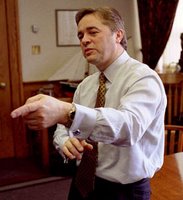Gord O'Connor, right, the soldier cum lobbyist cum newly minted minister of national defence is obviously confused about his new job.
Responding to questions about the prospects for a new battalion of soldiers for Goose Bay - promised during the last election - O'Connor responded that in Goose Bay that he can train soldiers and deploy them from there.
"There is a vast training area related to Goose Bay. I wouldn't have any problems, either, finding a training area for this battalion, so I can train this battalion at Goose Bay, and I can deploy them out of Goose Bay." [Emphasis added]Problem is that training soldiers is not Gordo's job any more.
Training soldiers - indeed of deciding on the force mix, basing and procurement (how many soldiers, sailors and air crew using what number of weapons and where deployed) - is the responsibility of Canada's military leadership based on the policy objectives set by the minister and the administration.
Now the odd thing in all this is that when faced with questions about his own substantive conflict of interest in procurement, Gordo stated publicly that his role isn't to make the actual procurement choices. According to Gordo, those decisions, like which transport aircraft to buy, come from the military leadership, preferably without the sort of porkbarrelling and partisan interference we saw during both the Mulroney and Chretien administrations.
O'Connor's confusion is something discussed on the Bond Papers before. His basing commitments and the associated pledge to raise thousands of new infantry soldiers all signal a return to the very bad old days at National Defence when defence policy consisted largely of political pork decisions. In those days Canada bought equipment, based soldiers and did a whole bunch of other things based not on the cost-effectiveness of the decision but on the partisan benefit to be gained from the spending.
 Gordo is pushing us back to a position not far removed from the time of Sam Hughes and the MacAdam shield shovel, left. It's an all-too-common situation in Canadian defence policy but many of us thought those days were gone.
Gordo is pushing us back to a position not far removed from the time of Sam Hughes and the MacAdam shield shovel, left. It's an all-too-common situation in Canadian defence policy but many of us thought those days were gone.Sam Hughes made a raft of truly horrid military policy decisions based on his unfounded belief that he knew far better than the professional military what Canadian defence forces needed. Gordo, the former soldier, seems to have similar beliefs, at least when he isn't trying to sidestep questions about his own conflicts of interest.
Fundamentally, O'Connor's comments on Goose Bay are one of the reasons why some time ago, Bond Papers offered the view that former soldiers, sailors or fliers made the most abysmal of national defence ministers.
What we seem headed toward in Canada is a bout of politically-inspired defence procurement that has little if anything to do with the proper defence of Canada. We will likely spend billions and have little to show for it of any substance in the end. At the same time we will have lost in the process the military that highly competent professional soldiers like Rick Hillier have been working to create.
In Goose Bay, though, the true cost of Gordo's old-fashioned views may well reap the most painful cost. Residents of that community may live in the hope of the cash coming from 650 soldiers that likely will never show up. For one thing, the Canadian Forces have been having difficulties meeting existing military expansion targets. O'Connor's commitments which are an order of magnitude beyond current military plans are likely to be totally unattainable.
For another thing, O'Connor may not survive long as minister. His successor may not share Gordo's penchant for goals that are unattainable and, in many respects, undesirable.
Taken in that context, Newfoundland and Labrador Premier Danny Williams gave residents of Labrador good advice:
"I would have to say to the residents of Goose Bay not to be too optimistic to see anything in the first 12 months, and then we'll be looking for strong signs after that," Williams said.The only variation that could be added is simply this: don't be too optimistic to see anything coming from O'Connor's promises.


